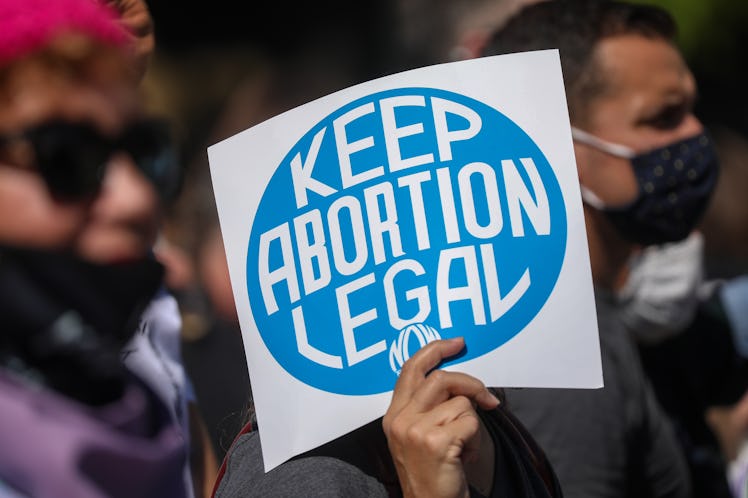
Biden’s SOTU Speech Got Real Blunt About Abortion Rights In The U.S.
He didn’t hold back.
As more and more states continue to crack down on reproductive rights, the Supreme Court’s landmark 1973 decision in Roe v. Wade seems to be buckling under the mounting weight of restrictive anti-choice legislation — namely, one court case that could severely undermine abortion rights across the nation. President Joe Biden highlighted this critical issue on Tuesday, and his quote about abortion from the 2022 State of the Union on March 1 was really straightforward.
Given the state of reproductive rights in the United States, it was maybe a given that Biden would have to address abortion during the speech. On Dec. 1, 2021, the Supreme Court heard arguments in Dobbs v. Jackson Women’s Health Organization, a case that’s expected to overturn, or at least severely undermine, the right to an abortion in the United States. The restrictive anti-choice law at the center of Dobbs v. Jackson is a Mississippi bill that passed in March 2018: If upheld by the nation’s most powerful court, which currently holds a 6-3 conservative majority, this piece of legislation would ban abortions after 15 weeks, with no exceptions for rape or incest.
“Advancing liberty and justice also requires protecting the rights of women. The constitutional right affirmed in Roe v. Wade — standing precedent for half a century — is under attack as never before,” Biden said during his March 1 speech, referencing the landmark 1973 abortion rights case which made abortion legal nationwide. “If we want to go forward—not backward—we must protect access to health care. Preserve a woman’s right to choose. And let’s continue to advance maternal health care in America.”
The current standard set by Roe v. Wade ensures people have the right to abortion until fetal viability, which usually occurs 22 to 24 weeks into gestation. This restrictive Mississippi law would move that deadline much earlier, effectively shrinking the window of time to obtain legal abortion care in certain states. If the Supreme Court ultimately upholds the law, it would open the door for other states which are hostile to abortion to pass laws which would de facto ban abortion access.
It’s not a far-fetched fear. On Sept. 1, 2021, the Supreme Court allowed a Texas law banning abortions at six weeks to go into effect. The law, SB8, bans abortion before many people even know they’re pregnant. What’s more, it gives citizens the power to enforce the law by civil lawsuits against people accused of “aiding and abetting” an abortion in violation of the law — a provision that’s been called a “bounty” on abortion providers and those who help pregnant people seeking an abortion.
While Biden’s comments were straightforward, many abortion rights advocates had mixed responses. In a statement shared with Elite Daily, NARAL Pro-Choice America President Mini Timmaraju said, “It’s clear that the Biden-Harris administration recognizes that reproductive freedom is under attack and this moment requires bold action. We’re grateful that President Biden noted this pivotal moment for our movement during his address.”
Other advocates called for Biden’s administration to go further. “While President Biden’s State of the Union remarks did mention the need to protect Roe v. Wade, he did not mention how he plans to do that and once again refused to use the word abortion — furthering stigma and once again not meeting the historic and terrifying moment we are in,” Renee Bracey Sherman, executive director of We Testify, said in a statement shared with Elite Daily.
The Supreme Court is expected to release their decision in Dobbs v. Jackson by June 2022, per CNBC.